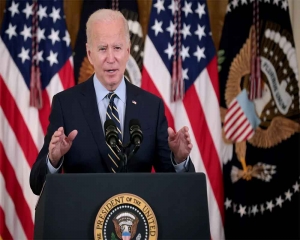Lloyd Austin, the Secretary of Defense in the Biden Administration, is an old hand in the perilously strategic Afghanistan-Pakistan region
Compared to the Donald Trump era, the Joe Biden Administration is expected to be more decentralised, stable and receptive to professional advice from the respective heads of all 15 executive departments. Given India’s security concerns, the appointment of the Secretary of Defense, who defines the security narrative as the “principal assistant to the President in all matters relating to the Department of Defense”, is significant. In the former four-star General, Lloyd Austin, Biden has picked a former combatant — who despite 41 years of illustrious service — has been described as an “intensely private man”, and who, like one of his predecessors and brother-in-arms, James Mattis, joins the administration in a nonpartisan role as an “Independent”.
As former Military Commander of the unified United States Central Command (CENTCOM) from March 2013 to March 2016, responsible among other countries for the perilously strategic Af-Pak region, Austin would have first-hand experience of the regional dynamics, religious extremism and the patent Pakistani ways. Earlier in 2011, when Austin was still commanding the US forces in Iraq, a US Special Forces raid in Abbottabad, Pakistan, had “taken out” Osama bin Laden from a safehouse less than a mile away from the Pakistani Military Academy. After deliberately keeping the Pakistanis in the dark to avoid them from “alerting the targets”, then US Secretary of Defense Leon Panetta had said that the Pakistanis were “either involved or incompetent”. Less than two years thereafter, Austin himself took over the overall CENTCOM and handled the clearly fractured US-Pakistan relations.
During Austin’s formative tenure as the CENTCOM head, he witnessed the breakdown in “talks” of the Pakistanis with the Taliban that had led to three particularly bloody incidents, i.e. execution of 23 Pakistani Frontier Force soldiers, the attack on Karachi airport killing 28, and the horrific Peshawar school massacre killing 148 — all leading to the reactionary Operation Zarb-e-Azb by the Pakistani forces. But the incorrigibility of the Pakistani ‘establishment’ soon saw the familiar dalliances with the extremist elements in the region, all to unsettle the Ashraf Ghani regime in Afghanistan, with the CENTCOM personnel paying for the same with their lives. In his three years of direct security control of the Af-Pak region, Austin would have surely grasped the frustrations, duplicitousness and unreliability of working with both — the Pakistani ‘establishment’ as also terror organisations like the Taliban in Afghanistan. Earlier still, as the 10th Mountain Division Commander in Afghanistan and 18th Airborne Corp Commander in Iraq, Austin would be conversant with the dangerously mutative nature of terror organisations. During a congressional hearing with the Senate Armed Service Committee, Austin had expressed: “We need Pakistan to take decisive actions.”
The other indelible imprint from Austin’s career would be his forgettable memories of the ill-fated and premature withdrawal of the US troops from Iraq in 2011 as forces inimical to America’s interests soon took over. The only thing that earned Austin praise in Iraq during the 2011 withdrawal was his supposed “mastery of logistics” in handling the same. Today, with an inherited commitment to undertake yet another eerily familiar and ill-fated withdrawal of the troops from Afghanistan, memories of the past haste will come rushing back. Irrespective of Austin’s eventual ability to reverse Trump’s commitment for the US troops’ withdrawal from Afghanistan, the military professional in Austin will recognise the irreplaceable criticality of Pakistan in sustaining personnel, assets and resources in Afghanistan. Therefore, reconciliatory expressions for Pakistan like “essential partner in any peace process in Afghanistan” are naturally par for course. Concurrently, Austin added sentences of immense clarity and specificity that ought to concern Islamabad, “Pakistan has also taken steps against anti-Indian groups, such as Lashkar-e-Tayyeba and Jaish-e-Mohammed” but added sharply, “although this progress is incomplete”. He also alluded to “Pulwama” by name and insisted that he “will press Pakistan to prevent its territorial misuse by terrorists”.
In one of the podcasts on Pakistan, after Austin had retired from the military but before he became the Secretary of Defense, he spoke of the “sticks and carrots” that he had employed in negotiating with Pakistan during his CENTCOM days. Lloyd had also expressed concerns over the Chinese readily “filling the void” of America’s displeasure in Pakistan, and on keeping a hawk-eye on Chinese efforts to “militarise” their investments in Pakistan. Therefore, the practical-minded Austin insisted on the larger merits of remaining “invested” and engaged in Pakistan while working on its behavioural aspects, as opposed to disengaging completely. This backdrop experience, maturity and clarity in Austin will ensure that there is no thundering bluster from the new Secretary of Defense, but more nuanced and behind-the-scenes efforts to correct the regional narrative. The gigantic man may be a man of few words but he was famous for carrying an M4 carbine instead of a traditional pistol on himself — today as the Secretary of Defense, he will be expected to invoke his experiences of success and failure for the better facilitation of security imperatives for the region.
(The writer, a military veteran, is a former Lt Governor of Andaman & Nicobar Islands and Puducherry. The views expressed are personal.)


























